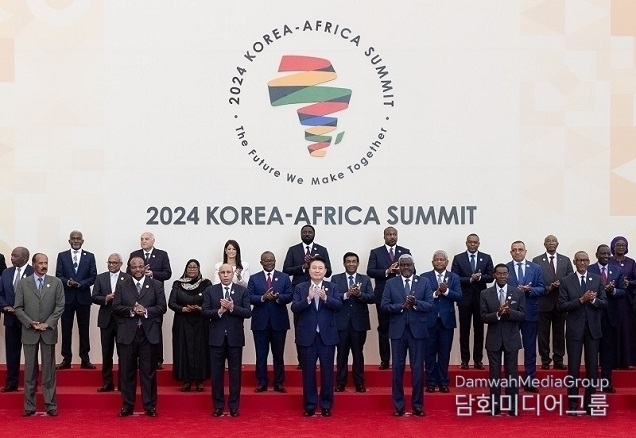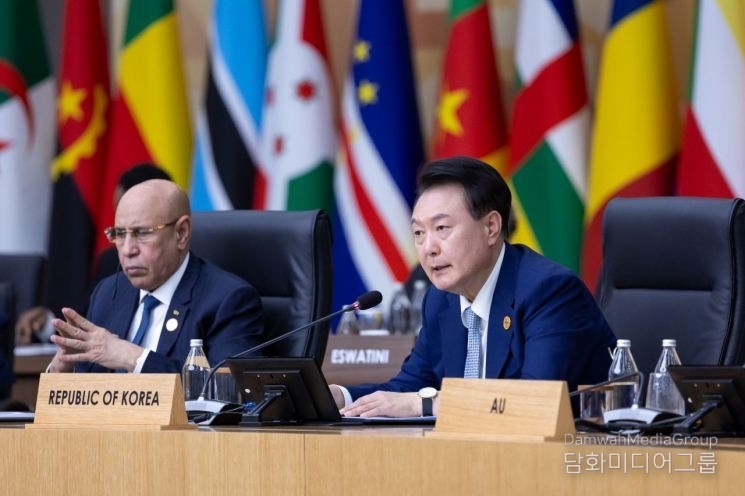By Diplomacy Journal Kayla Lee
The “Korea-Africa Key Minerals Dialogue” will be launched to strengthen global supply chain cooperation between Korea and Africa.
In addition, they will jointly endeavor to ensure the stable supply of key minerals and promote technical cooperation related to key minerals based on mutual agreement.

President Yoon Suk-yeol signed the joint declaration with the heads of state or government of 48 African countries at the Korea-Africa Summit held in Gyeonggi Province on June 4.
Africa holds 30 percent of the world's mineral resources, including key raw materials for the fourth industrial sector such as nickel, chromium, manganese, bauxite, cobalt, graphite, and lithium.
The agreement to launch the Korea-Africa Key Minerals Dialogue is expected to serve as a starting point for strengthening global supply chain cooperation.
In a joint press release, President Yoon said, “The ‘Key Minerals Dialogue’ between Korea and Africa will serve as a best practice to stabilize the supply chain through reciprocal cooperation and contribute to the sustainable development of mineral resources around the world.

In the joint declaration, the two sides pledged to build a future together based on a strong and reciprocal partnership centered on three pillars: shared growth, sustainability, and solidarity.
In the area of shared growth, the two sides emphasized the importance of Korea's efforts to support Africa's industrialization, the need to promote mutually beneficial trade and investment, and strengthen the Korea-Africa business partnership.
In this context, the two sides agreed to strengthen the institutional foundations of economic cooperation, such as the Economic Partnership Agreement (EPA), Trade and Investment Promotion Framework (TIPF), Double Taxation Avoidance Agreement (DTAA), and Investment Protection Agreement (IPA).
While welcoming efforts to build a single market and realize economic integration in the region through the African Continental Free Trade Area (AfCFTA), South Korea will share lessons learned from its experience in concluding multiple FTAs and support, among other things, capacity building of customs authorities and the establishment of a one-stop origin management system.
Infrastructure cooperation will also be promoted. In particular, Korea will apply its technologies in the field of smart infrastructure to large-scale projects such as roads, railways, bridges, ports, and airports.
In addition, the two sides agreed to strengthen education cooperation, including the provision of science and technology programs, the establishment of TVET schools, and the Global Korea Scholarship Program (GKS).
The two sides also confirmed their intention to promote cooperation to promote sustainability in responding to global challenges in the field of sustainability.
To respond to climate change, they agreed to strengthen cooperation on climate change mitigation and adaptation, cooperation on land and forest protection, marine conservation, and biodiversity preservation, and strengthen solidarity to build a climate finance structure that meets African needs.
They also agreed to strengthen cooperation for food security and sustainable agriculture through agriculture and green ODA, utilizing Korea's experience and know-how in smart farms and agricultural processing.
The two sides also emphasized the growing importance of mineral resources for the development of future industries such as electric vehicles, batteries, and renewable energy.
Recognizing that Korea is a leader in high-tech industries and that Africa is an important region in terms of key minerals, they agreed on the need to expand reciprocal cooperation and knowledge sharing, including at the subregional level, to promote the development of industries related to key minerals.
In this regard, they will launch the 'Korea-Africa Key Minerals Dialogue' and made joint efforts to promote technical cooperation related to key minerals, as well as Korean companies' investment in Africa and development of key mineral resources.
Finally, the solidarity section includes solidarity peace, security cooperation, and people-to-people exchanges.
The two sides reaffirmed their commitment to the full implementation of Security Council resolutions, while also emphasizing the international community's efforts to achieve the complete, verifiable and irreversible (CVID) denuclearization of the Korean Peninsula.
During its term as a non-permanent member of the UN Security Council, Korea will continue to work closely with the A3 (African non-permanent member) countries in the Security Council and strengthen cooperation at the UN, G20, and other international fora.
To promote the cooperation discussed at the Summit, Korea plans to increase its ODA to Africa to $10 billion by 2030, while also facilitating the expansion of Korean companies into Africa through export finance worth $14 billion.
In addition, to support and monitor the implementation of the outcomes of the Summit, Korea and Africa will strengthen the activities of the Korea-Africa Economic Cooperation Council and the Agriculture Ministers' Meeting, and establish new high-level consultative bodies such as the Customs Commissioners' Meeting.



